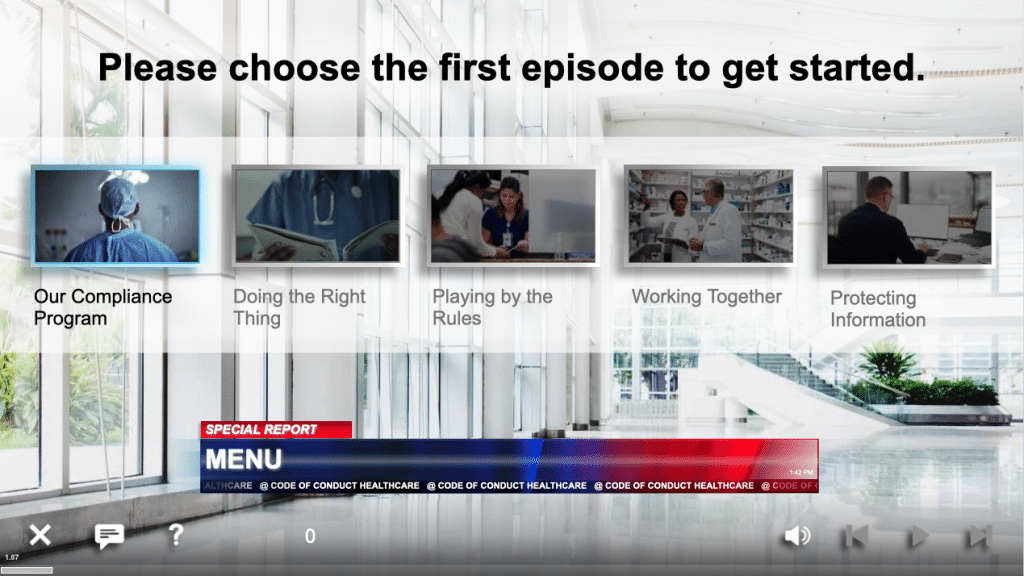
Healthcare Code of Conduct Training
Making the right ethical decisions can be challenging, especially in the healthcare industry. Providing guidance and reinforcing expectations for conduct can help employees navigate compliance issues.
Course description
Traliant's Healthcare Code of Conduct training is a 60-minute interactive training course tailored for employees and managers working in the healthcare industry. Topics are presented in a series of short episodes featuring video vignettes, Twitter Q&A, news stories and assessments and challenges. Each episode is designed to reinforce appropriate behavior and encourage individuals to raise questions and report their concerns. The course includes an acknowledgment form and link to an organization’s Code of Conduct policy.
ONLINE TRAINING
Healthcare Code of Conduct Training

Traliant’s Healthcare Code of Conduct Training covers:
- Key healthcare laws: False Claims Act; Stark Law, Anti-Kickback Statute, and Medicare Fraud, Waste and Abuse
- Elements of a successful compliance program: Oversight, Policies & Procedures, Reporting, Response & Prevention, Training & Education, Monitoring & Auditing, Enforcement & Discipline
- Ethical and compliance issues: Political Activities, Third-Party Due Diligence, Recordkeeping, Data Privacy, Information Security, Maintaining a Respectful Workplace
KEY FEATURES
Why you'll love our training
It’s time to embrace a new era of online training with a valued partner who will ensure seamless implementation, along with a learning experience your employees will truly enjoy.
Course administration
Traliant makes it simple to roll out training to your workplace and provide technical support directly to your employees at no additional cost.
Course customizations
Tailor courses to include your logo, relevant policies, workplace images, and more. Traliant can even customize the course with scenarios that take place in your own workplace environment.
Translations
Training is available in English, Spanish and is supported in over 100 languages.
What to consider when choosing the most effective healthcare code of conduct training

- Ensure legal compliance: Healthcare organizations are subject to a complex web of federal and state laws and regulations. Training helps to ensure that organizations are complying with these laws and that employees are aware of their obligations.
- Promote ethical behavior: Healthcare organizations have a responsibility to provide ethical and compassionate care to their patients. Training helps to promote a culture where ethical behavior is expected and valued.
- Protect the organization's reputation: Violations of healthcare laws and ethical standards can damage a company's reputation and lead to fines and penalties. Training helps to protect the organization's image and to ensure that employees are acting ethically and responsibly.
- Empower employees: Training provides employees with the knowledge and skills they need to understand and navigate the ethical and legal complexities of their work.
- Strengthen your organization's compliance program: A robust healthcare code of conduct training program is an essential component of a strong compliance program, helping to mitigate legal and reputational risks.
- Foster a culture of integrity: Training helps to create a culture where employees are aware of ethical and legal obligations and are committed to acting responsibly.
- The False Claims Act: This law prohibits submitting false or fraudulent claims to the government for healthcare services.
- The Stark Law: This law prohibits physicians from referring patients for certain services to entities with which they have a financial relationship.
- The Anti-Kickback Statute: This law prohibits offering or accepting anything of value to induce referrals of patients or to reward referrals.
- Medicare Fraud, Waste, and Abuse: This law prohibits practices that are considered to be fraudulent, wasteful, or abusive in relation to Medicare.
- Political Activities: Training may provide guidance on how to avoid engaging in political activities that could violate healthcare laws.
- Third-Party Due Diligence: Training may address the importance of conducting due diligence on third-party vendors and suppliers to ensure they are complying with ethical and legal standards.
- Recordkeeping: Training emphasizes the importance of maintaining accurate and complete records, as required by law.
- Data Privacy and Information Security: Training highlights the importance of protecting patient privacy and confidential information.
- Maintaining a Respectful Workplace: Training focuses on the importance of creating a respectful and inclusive workplace for all employees and patients.
- Leadership commitment: Strong leadership is essential for creating a culture of compliance.
- Policies and procedures: The organization must develop and implement clear policies and procedures for complying with healthcare laws and ethical standards.
- Training and education: Employees must receive regular training on healthcare laws, ethical standards, and the organization's policies and procedures.
- Reporting mechanisms: The organization must establish a system for employees to report potential violations of law or ethics.
- Response and prevention: The organization must have a plan for responding to violations and for preventing future violations.
- Monitoring and auditing: The organization must regularly monitor its compliance efforts and conduct audits to ensure that its program is effective.
- Enforcement and discipline: The organization must be prepared to enforce its compliance program and to discipline employees who violate the law or ethics.











